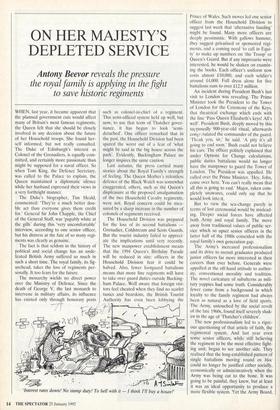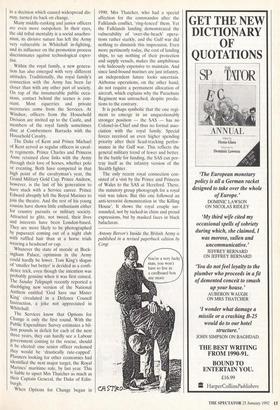ON HER MAJESTY'S DEPLETED SERVICE
Antony Beevor reveals the pressure
the royal family is applying in the fight to save historic regiments
WHEN, last year, it became apparent that the planned government cuts would affect many of Britain's most famous regiments, the Queen felt that she should be closely involved in any decision about the future of her Household troops. She found her- self informed, but not really consulted. The Duke of Edinburgh's interest as Colonel of the Grenadiers, is equally com- mitted, and certainly more passionate than might be supposed for a naval officer. So when Tom King, the Defence Secretary, was called to the Palace to explain, the Queen maintained a diplomatic silence while her husband expressed their views in a very forthright manner.
The Duke's biographer, Tim Heald, commented: 'They're a much better dou- ble act than everyone gives them credit for.' General Sir John Chapple, the Chief of the General Staff, was 'papably white at the gills' during this 'very uncomfortable' interview, according to one senior officer, but his distress at the fate of so many regi- ments was clearly as genuine.
The fact is that seldom in the history of political and social change has an unde- feated British Army suffered so much in such a short time. The royal family, its fig- urehead, takes the loss of regiments per- sonally. It too fears for the future.
The monarchy wields no direct power over the Ministry of Defence. Since the death of George V, the last monarch to intervene in military affairs, its influence has existed only through honorary posts such as colonel-in-chief of a regiment. This semi-official system held up well, but now, to use that term of Thatcher gover- nance, it has begun to look 'semi- detached'. One officer remarked that in the past, the Household Division had been spared the worst out of a fear of 'what might be said in the big house across the park'. Evidently, Buckingham Palace no longer inspires the same caution.
Last autumn, the press carried many stories about the Royal Family's strength of feeling. The Queen Mother's relentless defence of the Black Watch was somewhat exaggerated, others, such as the Queen's displeasure at the proposed amalgamation of the two Household Cavalry regiments, were not. Royal concern could be mea- sured by a sharp increase in the number of colonels of regiments received.
The Household Division was prepared for the loss of its second battalions Grenadier, Coldstream and Scots Guards. But the tourist industry failed to appreci- ate the implications until very recently. The new manpower establishment means that the 1994 Queen's Birthday Parade will be reduced in size: officers in the Household Division fear it could be halved. Also, fewer footguard battalions means that more line regiments will have to take over guard duties outside Bucking- ham Palace. Well aware that foreign visi- tors feel cheated when they find no scarlet tunics and bearskins, the British Tourist Authority has even been lobbying the
`Interest rates down! No stamp duty! To hell with it — I think I'll buy a house!' Prince of Wales. Such moves led one senior officer from the Household Division to suggest last week that 'alternative funding' might be found. Many more officers are deeply pessimistic. With gallows humour, they suggest privatised or sponsored regi- ments, and a coming need `to call in Equi- ty' to make up numbers on 'the Troop' or Queen's Guard. But if any impresario were interested, he would be shaken on examin- ing the books. Each officer's uniform now costs almost £10,000, and each soldier's around £4,000. Full dress alone for five battalions runs to over £12.5 million.
An incident during President Bush's last visit to London was revealing. The Prime Minister took the President to the Tower of London for the Ceremony of the Keys, that theatrical exchange which ends with the line 'Pass Queen Elizabeth's keys! All's well'. President Bush, deeply moved by this supposedly 900-year-old ritual, afterwards congratulated the commander of the guard. 'Thank you, sir,' he said. 'A pity it's all going to end soon.' Bush could not believe his ears. The officer politely explained that under Options for Change calculations, public duties battalions would no longer have the manpower to guard the Tower of London. The President was appalled. He called over the Prime Minister. 'Hey, John, come over here. You can't really mean that all this is going to end.' Major, taken com- pletely unawares, could only say that he would look into it.
But to view the sea-change purely in terms of lost ceremonial would be mislead- ing. Deeper social forces have affected both Army and royal family. The move away from traditional values of public ser- vice which so upset senior officers in the latter half of the 1980s coincided with the royal family's own generation gap.
The Army's increased professionalism and its drive to recruit graduates produced junior officers far more interested in their careers than ever before. Generals were appalled at the off-hand attitude to author- ity, conventional morality and tradition. The novel caricature of subalterns as mili- tary yuppies had some truth. Considerably fewer came from a background in which loyalty to the family regiment had always been as natural as a love of field sports. The Army, untouched by the social revolt of the late 1960s, found itself severely shak- en in the age of 'Thatcher's children'.
The new professionalism led to a rigor- ous questioning of that article of faith, the regimental system. And last year even some senior officers, while still believing the regiment to be the most effective fight- ing unit, began to see another side. They realised that the long-established pattern of single battalions moving round en bloc could no longer be justified either socially, economically or administratively when the Army was being cut to the bone. It was going to he painful, they knew, but at least it was an ideal opportunity to produce a more flexible system. Yet the Army Board, in a decision which caused widespread dis- may, turned its back on change.
Many middle-ranking and junior officers are even more outspoken. In their eyes, the old tribal mentality is a social anachro- nism, its divisive nature has left the Army very vulnerable in Whitehall in-fighting, and its influence on the promotion process discriminates against technological exper- tise.
Within the royal family, a new genera- tion has also emerged with very different attitudes. Traditionally, the royal family's connection with the Army has been far closer than with any other part of society. On top of the innumerable public occa- sions, contact behind the scenes is con- stant. Most equerries and private secretaries come from the Services. At Windsor, officers from the Household Division are invited up to the Castle, and members of the royal family sometimes dine at Combermere Barracks with the Household Cavalry.
The Duke of Kent and Prince Michael of Kent served as regular officers in caval- ry regiments. Prince Charles and Princess Anne retained close links with the Army through their love of horses, whether polo or eventing. Both have competed in that high point of the cavalryman's year, the Grand Military Gold Cup. Prince Andrew, however, is the last of his generation to have stuck with a Service career. Prince Edward abruptly left the Royal Marines to join the theatre. And the rest of his young cousins have shown little enthusiasm either for country pursuits or military society. Attracted to glitz, not tweed, their lives and interests have been London-based. They are more likely to be photographed by paparazzi coming out of a night club with ruffled hair than at a horse trials wearing a headscarf or cap.
Whatever the state of morale at Buck- ingham Palace, optimism in the Army could hardly be lower. Tom King's slogan of 'smaller but better' is derided as a confi- dence trick, even though the intention was probably genuine when it was first coined. The Sunday Telegraph recently reported a disobliging new version of the National Anthem entitled 'God Save our Mister King' circulated in a Defence Council Instruction, a joke not appreciated in Whitehall.
The Services know that Options for Change is only the first round. With the Public Expenditure Survey estimates a bil- lion pounds in deficit for each of the next three years, they can hardly see a Labour government coming to the rescue, should it be elected: one senior officer reckoned they would be 'drastically rate-capped'. Planners looking for other economies had identified the next major target, the Royal Marines' maritime role, by last year. This is liable to upset Mrs Thatcher as much as their Captain General, the Duke of Edin- burgh.
When Options for Change began in 1990, Mrs Thatcher, who had a special affection for the commandos after the Falklands conflict, 'ring-fenced' them. Yet the Falklands landing demonstrated the vulnerability of 'over-the-beach' opera- tions rather starkly, and the Gulf war did nothing to diminish this impression. Even more pertinently today, the cost of landing ships, to say nothing of their protection and supply vessels, makes the amphibious role hideously expensive to maintain. And since land-bound marines are just infantry, an independent future looks uncertain. Airborne operations, on the other hand, do not require a permanent allocation of aircraft, which explains why the Parachute Regiment was untouched, despite predic- tions to the contrary.
It is perhaps symbolic that the one regi- ment to emerge in an unquestionably stronger position — the SAS — has no Colonel-in-Chief and thus no formal asso- ciation with the royal family. Special forces received an even higher spending priority after their Scud-tracking perfor- mance in the Gulf war. This reflects the general military trend of fewer and better. In the battle for funding, the SAS can por- tray itself as the infantry version of the Stealth fighter.
The only recent royal connection con- sisted of a visit by the Prince and Princess of Wales to the SAS at Hereford. There, the statutory group photograph for a royal visit was taken. But this one followed an anti-terrorist demonstration in 'the Killing House'. It shows the royal couple sur- rounded, not by tucked-in chins and proud expressions, but by masked faces in black balaclavas.
Antony Beevor's Inside the British Army is published in a revised paperback edition by Corgi



















































 Previous page
Previous page